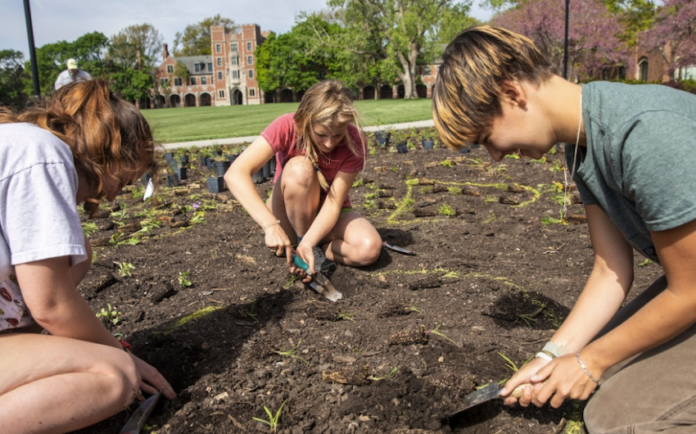Published:
From energy-efficient buildings to thriving prairies, sustainable touches are present across every acre of Grinnell’s campus. This Earth Week, April 22-29, sustainability staff at the College are spotlighting these green initiatives while also prompting members of the community to consider their own environmental footprints.
Earth Day Celebrations on Campus
Grinnell’s sustainability coordinators play a primary role in maintaining and publicizing the College’s sustainable efforts. During Earth Week, student coordinators will be tabling daily in the Joe Rosenfield Center to provide information about their respective areas of focus. Topics will include energy, compost/recycling, water and land, and tables will offer an opportunity for students, staff, and faculty to provide suggestions to the College.
Sam Drake-Flam ’25 has been a member of the sustainability committee since her first year, working as a land steward to support native planting. In anticipation of Earth Week, she would like to remind students about the breadth of prairie land in and around Grinnell.
“Simply interacting with the prairies and enjoying them is a huge support,” she said. “They are on campus for students and community members to enjoy – read, sit, breathe them in, and show them love!”
In addition to appreciating Iowa’s native landscape, Drake-Flam cited volunteering as one way students can support local sustainability this Earth Week.
“There is always endless weeding for us to do, and volunteers are so helpful with that,” Drake-Flam said. “If we know there is interest and time within the student body, then we know to organize a structured event.”
Students, staff, and community members can enjoy a breadth of Earth Week programming alongside the offerings of the sustainability committee. Film Club’s Earth Week Film Series and a concert by the EcoMadres Ensemble are among events open to the public. For a full list of Earth Week events, see the Earth Week Poster.
Sustainable Solutions: E-Cycle Event Saturday, April 29
Alongside programming spearheaded by students, Grinnell College, Mahaska Communication Group (MCG), Imagine Grinnell, and Bayer Crop Science will host an E-Cycle Event on April 29 at the Bayer location (2021 6th Ave.) just east of the Facilities Management office. At the event, students, staff, faculty, and community members can drop off unwanted electronics to be safely disposed of, free of charge. Accepted items include PCs, printers, VCRs, cell phones, TVs, and laptops.
Chris Bair, Environmental and Safety Coordinator, stresses the importance of safely disposing electronics.
“For environmental reasons, anytime you can recycle something and not add it to the landfill, that’s great,” he said. “There are certain heavy metals in electronics that are especially bad to send to the landfill.”
Aside from the environmental benefits of safe electronics disposal, dropping off waste at the E-Cycle event is more convenient than a trip to the landfill. Drop-offs can be completed at the Bayer entrance (2021 6th Ave.), just east of the Facilities Management office from 8 a.m. to noon on Saturday, April 29th.
Going Green: Grinnell College’s New Solar Plants and Sustainable Buildings Set to Boost Renewable Energy
Beyond sharing with the Grinnell community about individual climate responsibility, an additional Earth Week goal of Bair and the sustainability committee is highlighting the College’s upcoming environmental efforts.
One such development is in the solar department, where two solar plants are anticipated to contribute significant renewable energy to the College’s current systems. The first plant located on 16th Avenue, is “mechanically complete” and generates approximately one-third of the campus’ electricity consumption. On the west side of town, an additional two-megawatt plant location is being explored in partnership with the City of Grinnell and Alliant Energy.
“If both plants are developed, our campus will be 50% renewable. That’s really, really exciting,” Bair said. “The grid in general is getting greener and greener. Potentially we will be 75% renewable here in another couple three years.”
Another way Grinnell’s campus continues to get greener is through its buildings.Older buildings, like the Joe Rosenfield Center, feature energy-efficient components like reflective roofs and thermal energy wheels. Newly completed buildings, such as the Humanities and Social Studies Center (HSSC), are constructed entirely with sustainability in mind. Features like geothermal heating, climate control and rainwater irrigation systems are among what make the HSSC the “greenest building on campus.”
“It’s important to not lose [sustainability] opportunities on the front end of building a building,” Bair said. “I think we’re doing a really good job of that. All of our new buildings are crazy efficient, and the HSSC especially is just a marvel at how little energy it consumes.”
While it is important for students to be conscious of their own resource usage, Bair reports that students are not the primary source of energy usage on campus.
“When almost everyone went home for COVID, electricity should have been at its lowest, right? But total campus electricity only went down by about 18%, so we learned that student behavior isn’t going to save a whole lot of electricity on campus,” Bair said.
Nonetheless, there are steps students can take to support the College’s sustainable initiatives. Taking note of recycling guidelines and monitoring water usage – particularly in the shower – are two simple ways to limit one’s environmental impact. For students and community members seeking further ways to take sustainable action, attending this year’s Earth Week programming or utilizing the E-Cycle event on April 29th to dispose of unwanted electronics will be a helpful place to begin.
For more information about sustainability on Grinnell’s campus, visit the sustainability page.







